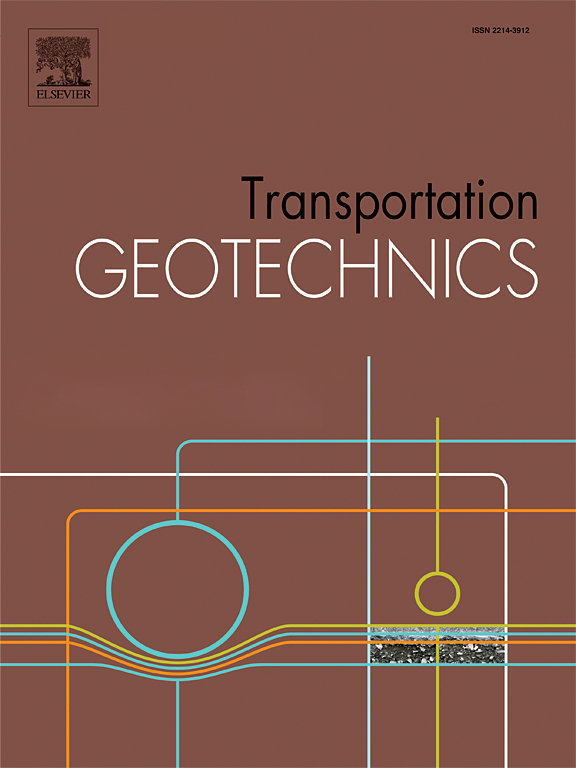Advances in innovative sustainable transportation geotechnics
IF 4.9
2区 工程技术
Q1 ENGINEERING, CIVIL
引用次数: 0
Abstract
Transportation geotechnics integrates geotechnical engineering principles into planning, construction, and maintenance of transportation infrastructures such as roads, highways, railways, bridges, and tunnels, vital yet resource-intensive infrastructures that demand significant attention with respect to sustainable practices. Recently, there has been a growing emphasis on implementing sustainability approaches in transportation geotechnics. This shift holds promise for environmental, economic, and societal sustainability, with potential benefits that include reducing the construction industry’s carbon footprint, conserving natural resources, minimizing harmful emissions, and lowering transportation infrastructure costs. This review explores diverse strategies for advancing sustainability in transportation geotechnics, encompassing innovative materials, ground improvement techniques, and use of geosynthetics. Life-cycle assessments of sustainable transportation geotechnics in terms of environmental impacts have also been investigated. A case study is presented to illustrate the practical implementation of sustainable geosynthetics in the United States, offering practical insights into real-world implementations. Challenges, opportunities, and future directions in integrating sustainability into transportation geotechnics are also discussed, offering a roadmap for advancing environmentally-responsible and economically-viable infrastructure development.
创新型可持续交通土工技术的进展
交通岩土工程学将岩土工程学原理融入到公路、高速公路、铁路、桥梁和隧道等交通基础设施的规划、建设和维护中,这些基础设施至关重要,但也是资源密集型的,需要在可持续实践方面给予高度重视。最近,人们越来越重视在交通岩土工程中采用可持续发展的方法。这种转变为环境、经济和社会的可持续发展带来了希望,其潜在效益包括减少建筑业的碳足迹、保护自然资源、最大限度地减少有害气体排放以及降低交通基础设施成本。本综述探讨了推进交通土工技术可持续发展的各种策略,包括创新材料、地基改良技术和土工合成材料的使用。此外,还从环境影响的角度对可持续交通土工技术的生命周期进行了评估。报告中还介绍了一个案例研究,说明可持续土工合成材料在美国的实际应用情况,为现实世界中的应用提供了实用的见解。此外,还讨论了将可持续性融入交通土工技术的挑战、机遇和未来方向,为推进对环境负责且经济上可行的基础设施发展提供了路线图。
本文章由计算机程序翻译,如有差异,请以英文原文为准。
求助全文
约1分钟内获得全文
求助全文
来源期刊

Transportation Geotechnics
Social Sciences-Transportation
CiteScore
8.10
自引率
11.30%
发文量
194
审稿时长
51 days
期刊介绍:
Transportation Geotechnics is a journal dedicated to publishing high-quality, theoretical, and applied papers that cover all facets of geotechnics for transportation infrastructure such as roads, highways, railways, underground railways, airfields, and waterways. The journal places a special emphasis on case studies that present original work relevant to the sustainable construction of transportation infrastructure. The scope of topics it addresses includes the geotechnical properties of geomaterials for sustainable and rational design and construction, the behavior of compacted and stabilized geomaterials, the use of geosynthetics and reinforcement in constructed layers and interlayers, ground improvement and slope stability for transportation infrastructures, compaction technology and management, maintenance technology, the impact of climate, embankments for highways and high-speed trains, transition zones, dredging, underwater geotechnics for infrastructure purposes, and the modeling of multi-layered structures and supporting ground under dynamic and repeated loads.
 求助内容:
求助内容: 应助结果提醒方式:
应助结果提醒方式:


